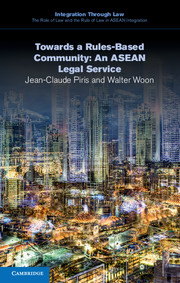3 - The ASEAN Legal Service
Published online by Cambridge University Press: 05 March 2015
Summary
The first two chapters of this monograph have set out the history and structure of ASEAN in order to enable the reader to understand the current reality. This is the essential context within which to consider the role of a putative ASEAN Legal Service. However, before proceeding to deal with ASEAN, it is instructive to look at how other international organisations have organised their legal services.
The European Union
Though ASEAN has sometimes been compared with the EU, it is clear that the ASEAN Legal Service cannot be directly based on the model of the legal services of the institutions of the EU.
3.1.1 The EU legal order
The EU has established a new legal order which differs widely from classic public international law. The institutions of the EU are part of a very sophisticated and integrated system of law.
As one of the authors of this book wrote in 1999:
in very simple terms, the present situation might be described as follows: the EU has law-making institutions, including a Council composed of Ministers who are members of national governments of the member states, and a directly elected European Parliament. The Council and the Parliament share the power of co-deciding legislative, administrative and budgetary acts, which are proposed by the Commission. The Commission, which exercises the powers conferred on it by the Council for the implementation of (EU) law, also ensures that this law is applied and may take a member state to Court if it fails to fulfil its obligations. The Parliament shares with the member states the power to approve the appointment of the President of the Commission and of the Commission as a whole; the Parliament has also the power to remove the Commission from office. The laws adopted by these institutions within the fields of power of the (EU) are superior to the laws of the member states and may have direct effects on the citizens of the Union.
- Type
- Chapter
- Information
- Towards a Rules-Based Community: An ASEAN Legal Service , pp. 113 - 182Publisher: Cambridge University PressPrint publication year: 2015

